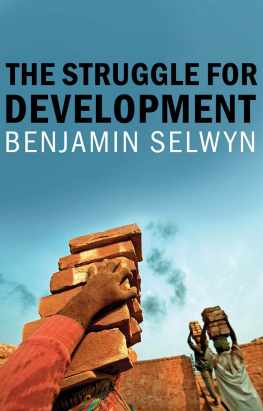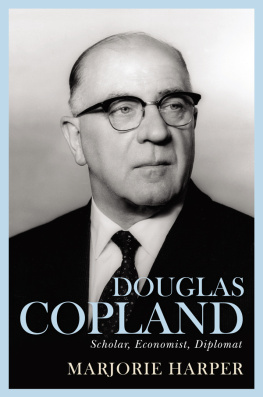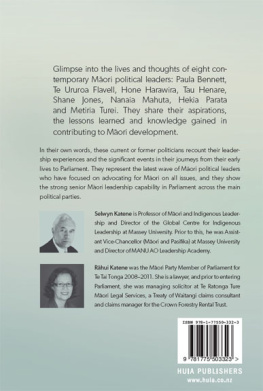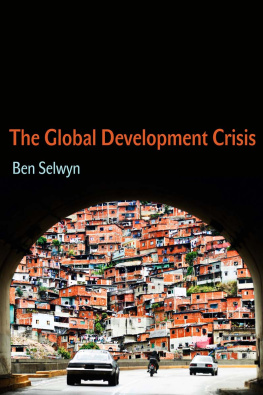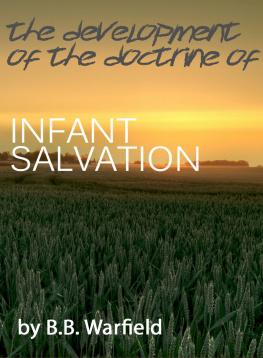Benjamin Selwyn - The Struggle for Development
Here you can read online Benjamin Selwyn - The Struggle for Development full text of the book (entire story) in english for free. Download pdf and epub, get meaning, cover and reviews about this ebook. City: Cambridge, year: 2017, publisher: John Wiley & Sons, Inc.;Polity Press, genre: Politics. Description of the work, (preface) as well as reviews are available. Best literature library LitArk.com created for fans of good reading and offers a wide selection of genres:
Romance novel
Science fiction
Adventure
Detective
Science
History
Home and family
Prose
Art
Politics
Computer
Non-fiction
Religion
Business
Children
Humor
Choose a favorite category and find really read worthwhile books. Enjoy immersion in the world of imagination, feel the emotions of the characters or learn something new for yourself, make an fascinating discovery.
- Book:The Struggle for Development
- Author:
- Publisher:John Wiley & Sons, Inc.;Polity Press
- Genre:
- Year:2017
- City:Cambridge
- Rating:5 / 5
- Favourites:Add to favourites
- Your mark:
- 100
- 1
- 2
- 3
- 4
- 5
The Struggle for Development: summary, description and annotation
We offer to read an annotation, description, summary or preface (depends on what the author of the book "The Struggle for Development" wrote himself). If you haven't found the necessary information about the book — write in the comments, we will try to find it.
The Struggle for Development — read online for free the complete book (whole text) full work
Below is the text of the book, divided by pages. System saving the place of the last page read, allows you to conveniently read the book "The Struggle for Development" online for free, without having to search again every time where you left off. Put a bookmark, and you can go to the page where you finished reading at any time.
Font size:
Interval:
Bookmark:

For Mjriam
Benjamin Selwyn
polity
Copyright Benjamin Selwyn 2017
The right of Benjamin Selwyn to be identified as Author of this Work has been asserted in accordance with the UK Copyright, Designs and Patents Act 1988.
First published in 2017 by Polity Press
Polity Press
65 Bridge Street
Cambridge CB2 1UR, UK
Polity Press
350 Main Street
Malden, MA 02148, USA
All rights reserved. Except for the quotation of short passages for the purpose of criticism and review, no part of this publication may be reproduced, stored in a retrieval system or transmitted, in any form or by any means, electronic, mechanical, photocopying, recording or otherwise, without the prior permission of the publisher.
ISBN-13: 978-1-5095-1282-9
A catalogue record for this book is available from the British Library.
Library of Congress Cataloging-in-Publication Data
Names: Selwyn, Ben, author.
Title: The struggle for development / Ben Selwyn.
Description: Cambridge, UK ; Malden, MA : Polity Press, 2017. | Includes bibliographical references and index.
Identifiers: LCCN 2017004330 (print) | LCCN 2017020101 (ebook) | ISBN 9781509512812 (Mobi) | ISBN 9781509512829 (Epub) | ISBN 9781509512782 (hardback) | ISBN 9781509512799 (pbk.) Subjects: LCSH: Economic development.
Classification: LCC HD82 (ebook) | LCC HD82 .S428 2017 (print) | DDC 338.9--dc23
LC record available at https://lccn.loc.gov/2017004330
The publisher has used its best endeavours to ensure that the URLs for external websites referred to in this book are correct and active at the time of going to press. However, the publisher has no responsibility for the websites and can make no guarantee that a site will remain live or that the content is or will remain appropriate.
Every effort has been made to trace all copyright holders, but if any have been inadvertently overlooked the publisher will be pleased to include any necessary credits in any subsequent reprint or edition.
For further information on Polity, visit our website: politybooks.com
This book contributes to development thinking, policy and practice in two ways. The vast majority of development literature and policy analyses are based upon elitist conceptions of social change, where states and corporations are identified as primary development actors. This book, by contrast, views social change from the bottom up. Its first contribution is to conceptualise development from the perspective of labouring classes. Doing so provides an answer to the puzzle of expanding (and highly concentrated) wealth in a sea of global poverty. Secondly, it contends that collective actions by labouring classes, far from undermining development, which is how elite conceptions of social change portray them, generate real human development. Once this two-part argument is grasped, then the project of seeking to engender human development assumes a new perspective.
Some of the chapters in this book draw upon and develop arguments previously published. Part of chapter 3 was published as a Centre for Global Political Economy working paper (no. 10, 2016). Parts of were published in Third World Quarterly (both vol. 7, 2016).
In writing this book I have incurred many intellectual debts. First and foremost, my colleagues in the Historical Materialism World Development Research Seminar (HMWDRS) continue to provide the most stimulating forum within which to collectively understand and apply Marxist political economy to contemporary capitalism. Over the years HMWDRS has included Liam Campling, Satoshi Miyamura, Jon Pattenden, Gavin Capps, Elena Baglioni, Owen Miller, Alessandra Mezzadri, Sam Ashman, Helena Prez Nio, Demet Dinler, Jeff Webber, Penny Howard and Kristian Lasslett.
Many people have read parts of this book and/or discussed it with me and in the process have suggested improvements. They include Tom Selwyn, Andy Sumner, Thomas Pogge, David Woodward, Luke Martell, Adam Fishwick, Felipe Antunes, Lucia Pradella, Ray Kiely, Mary Mellor, Siobhn McGrath, John Minns, Leslie Sklair, Peter Newell, Tom Marois, David Ockwell, Julian Germann, Sam Knafo, Earl Gammon, Andreas Bieler, Kalpana Wilson, Feyzi Ismail, Haroon Akram-Lodhi, Carlos Oya, Tony Norfield, Paul Cammack and Juanita Elias.
I am truly lucky to work alongside wonderful colleagues in the Department of International Relations and in the Centre for Global Political Economy (CGPE) at the University of Sussex. Rorden Wilkinson and Andrea Cornwall, as head of department and head of school respectively, deserve special thanks as they have worked extra hard to generate creative time and space for colleagues to pursue their research. Students at Sussex, at undergraduate, MA and PhD level, are simply marvellous and have, over the years, provided much critical stimulation to my thinking about global development.
I am deeply indebted to four brilliant thinkers who, knowingly or not, helped me construct my intellectual foundations. These are Henry Bernstein, Chris Harman, Ellen Meiksins Wood and Michael Lebowitz.
I am very grateful to John Minns, director of the Australian National Centre for Latin American Studies (ANCLAS) at the Australian National University, who made it possible for me to spend six fantastic weeks conducting research and writing at the centre in late 2015.
I thank Louise Knight, Nekane Tanaka Galdos, Clare Ansell, Caroline Richmond and David Held at Polity for supporting this project.
Our daughter Valentina has provided continuous entertainment over the last three years. Most profoundly, I thank my wife Mjriam, who supported me all the way through this and previous labours, and who has always pushed me to explain my ideas with more clarity. To her I dedicate this book.
The great are only great because we are on our knees. Let us rise up.
Louis-Marie Prudhomme, Rvolutions de Paris
The Big Lie
In his dystopic novel 1984, George Orwell depicts a world of perpetual war, total government surveillance and infinite ideological manipulation of the population. The novels main character, Winston, describes how the state pursues ideological manipulation through the practice of doublethink, which he defines as follows:
To know and not to know, to be conscious of complete truthfulness while telling carefully constructed lies, to use logic against logic, to repudiate morality while laying claim to it . To tell deliberate lies while genuinely believing in them, to deny the existence of objective reality and all the while to take account of the reality which one denies. (Orwell 1977: ch. 3, ch. 9)
In this book I argue that contemporary reasoning about development, as propounded by institutions such as the United Nations, the International Labour Organization, the World Bank, many non-governmental organisations, state leaders and the mass media, represents a giant exercise in doublethink. It is based on an endlessly repeated set of interlinked claims:
- 1 that continued economic growth represents the surest route towards poverty reduction and development;
- that a rising number of people across the world are enjoying the fruits of this development;
- that this improvement is due to their increasing participation in global markets; and
- that it is possible to envision a world free of poverty within our lifetimes.
These arguments, and those actors and institutions that promote them, are here labelled the Anti-Poverty Consensus (APC).
Font size:
Interval:
Bookmark:
Similar books «The Struggle for Development»
Look at similar books to The Struggle for Development. We have selected literature similar in name and meaning in the hope of providing readers with more options to find new, interesting, not yet read works.
Discussion, reviews of the book The Struggle for Development and just readers' own opinions. Leave your comments, write what you think about the work, its meaning or the main characters. Specify what exactly you liked and what you didn't like, and why you think so.

